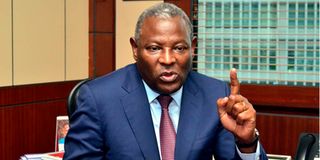How Equity Group ended tribal bank tag in Kibaki era

Equity Group chief executive officer James Mwangi.
Accusations in Parliament that Equity Group was a tribal bank given its heavy presence in Nairobi and central Kenya triggered the lender’s expansion across the country.
The bank kicked off an aggressive expansion targeting Rift Valley, western Kenya and Nyanza hinged on its model of focusing on the poor and bottom end of the market, giving the lender a national outlook.
ODM leader Raila Odinga's brother Oburu Oginga revealed this shift in his new book, In the Shadow of My Father.
A chance meeting between Dr Oburu, who was then the chairman of the parliamentary Finance Committee, and former Equity Group chair Peter Munga, triggered the regional expansion plan.
The bank at the time, in 2006, was facing accusations that it was a Kikuyu bank serving the interest of President Mwai Kibaki who retired in 2013.
“There was a sustained hue and cry in Parliament with some legislators charging that Equity was a Kikuyu bank and that it was being used for political ends by President Mwai Kibaki,” writes Oburu in his new autobiography.
This led to Equity opening branches in Mbita, Kisumu, Siaya and Homa Bay towns in quick succession and ultimately to other towns in western Kenya.
“The political noise eventually died when the bank went fully national,” said Dr Oburu, a position that Equity Bank has backed.
In December, Equity Group had 336 branches across East Africa with 190 branches located in Kenya, which had 42 outlets in 2016.
The bank has risen to be Kenya’s most profitable bank and the largest on the back of mergers and acquisitions and expansion of branches.
For more, read here





